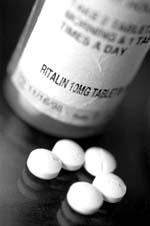 Specific Drug: Methylphenidate (Ritalin)
Specific Drug: Methylphenidate (Ritalin)
Classification: Psychostimulant
Commercial Names: Attenade, Focalis, Ritalin
Common Names/Nicknames: MPH, R-ball, Skippy, Smart Drug, Vitamin R
Active Compound: Methylphenidate
Found in: Synthetic methylphenidate
Mode of Consumption: Ingestion, insufflation, intravenous injection
DEA Scheduling/Legal Status (in US): Schedule II, legal with prescription
Effects:
Increased concentration, increased energy, mental alertness, blood pressure variations, rapid heart rate, loss of appetite, psychotic episodes
Risks:
Addiction, withdrawal, stroke, pulmonary embolism, psychosis, paranoia, schizophrenia, fatal overdose
Insufflation: nasal septum damage; Injection: blood-bourne pathogens, pulmonary damage (talcosis), endocarditis, abscess
Dangerous Drug Combinations:
Potentially fatal mix with cocaine and other stimulants. Dangerous combination with cold medications, heart disease medications, and antidepressants.
Special Considerations:
Methylphenidate can be abused in academic settings for its ability to increase alertness.
And remember, if somebody may need help, play it safe and call for medical assistance.
“Students may bring an intoxicated or drug-impaired friend to University Health Services or to a hospital, or seek assistance from College residential life staff or HUPD, and by doing this, neither they nor the friend will face disciplinary action from the College for having used or provided alcohol or drugs.”
The Amnesty Policy
Harvard College Student Handbook
Sources:
Buzzed: The Straight Facts About the Most Used and Abused Drugs from Alcohol to Ecstasy (Third Edition), by Cynthia Kuhn, Scott Swartzwelder, and Wilkie Wilson. Published 2008 by W. W. Norton & Company.
National Institute on Drug Abuse (NIDA), part of the National Institute of Health (NIH) of the U.S. Department of Health and Human Services.
http://www.nida.nih.gov/DrugPages/
U.S. Drug Enforcement Agency (DEA), part of the U.S. Department of Justice.
Erowid Organization

